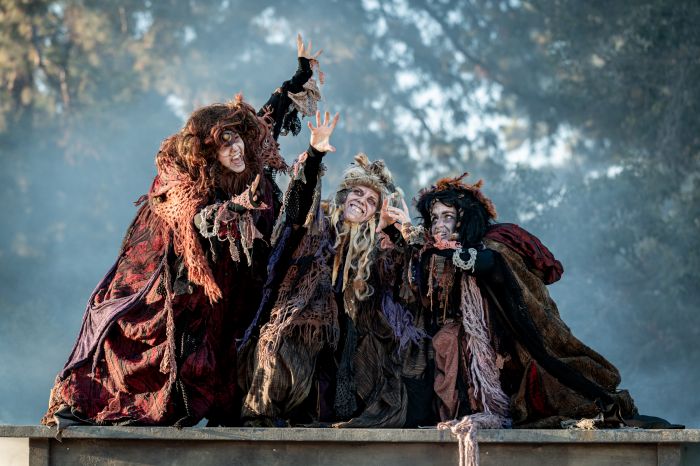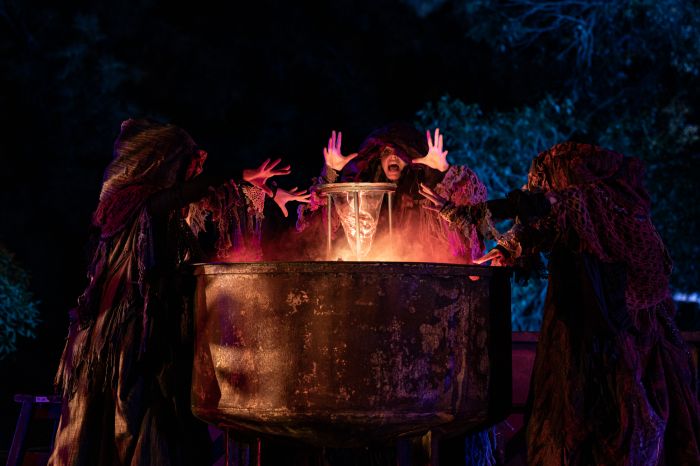Following a sold-out run in Melbourne, the Australian Shakespeare Company brings Macbeth to the verdant expanse of Kew Gardens for a summer season under open skies. Directed by Glenn Elston, this is a production steeped in tradition—faithful to the original text and unafraid of its darker undercurrents. It’s a clear, accessible rendition that will appeal to both newcomers (my six and eight year old daughters included) and those who prefer their Shakespeare unembellished.
Elston’s approach is traditionalist rather than revolutionary. There are no radical reimaginings or contemporary overlays, and even the infamously divisive Porter scene is retained in full. While the absence of novelty may deter those hungry for reinterpretation, this is a solid, articulate production that prizes narrative clarity over directorial flair.
The pacing is brisk, and soliloquies are used to good effect to draw the audience into Macbeth’s psychological descent. Actors frequently move through the aisles, softening the divide between stage and spectator. However, a few key moments—such as Lady Macbeth’s unravelling and the tragedy surrounding Banquo’s family—would benefit from a more measured tempo to allow the emotional intensity to properly land.
There’s a distinctly audio-driven quality to the delivery, with much of the cast adopting the rich, resonant tones of radio drama. At times, this borders on overwrought, but overall performances are engaging. Hugh Sexton delivers a complex and layered Macbeth, balancing ambition with internal torment. Nicole Nabout begins as a commanding Lady Macbeth, gradually descending into bewildered vulnerability in the play’s later scenes. The chemistry between the two is convincing—first conspiratorial, later combustible.
Jackson McGovern makes a memorable impression as Macduff, handling the character’s emotional arc with subtlety—from raw grief to steely determination. Anna Burgess brings quiet authority to Malcolm, while Johnny Light offers a charismatic Banquo, whose ghostly reappearance is delivered with icy restraint.
Visually, the staging is modest. A simple set comprising a castle backdrop and a long banquet table does little to elevate the aesthetic and occasionally appears makeshift. The liberal use of fog effects, though atmospheric, sometimes veers into excess, shrouding the action more than enhancing it. That said, Peter Amesbury’s lighting design makes excellent use of the gardens’ natural splendour. As dusk falls and the trees darken into silhouettes, Burnham Wood feels palpably alive—awash with shifting light, deep shadows, and spectral glows.
Karla Erenbots’s costume design adds an intriguing stylistic flourish. The overall look is tribal and gothic, combining textured fabrics, animal pelts and dark tones to lend the ensemble a primitive, warlike air. A striking transformation occurs during Macbeth’s second vision, where the witches—initially cloaked in layers of matted fabric—shed their skins to become spectral figures in pale, floating gowns. It’s a haunting visual that subtly nods to the play’s supernatural themes.
The choreography, led by Scott Jackson, is another standout aspect of the production. The swordplay is sharply executed and adds a visceral edge to the climactic moments. These fight scenes, while not overindulgent, inject a welcome burst of tension and physicality.
This is not a Macbeth that sets out to surprise, but rather one that honours the text and leans into atmosphere. The lack of artistic reinvention is compensated for by strong performances, a committed cast, and the sheer beauty of the al fresco setting. Shakespeare under the stars—especially in a place as enchanting as Kew—remains one of summer’s simplest, yet greatest pleasures.
Macbeth is playing at Theatre on Kew, Royal Botanic Gardens, Kew, until 31 August. For tickets, please visit theatreonkew.starlight-tickets.co.uk












